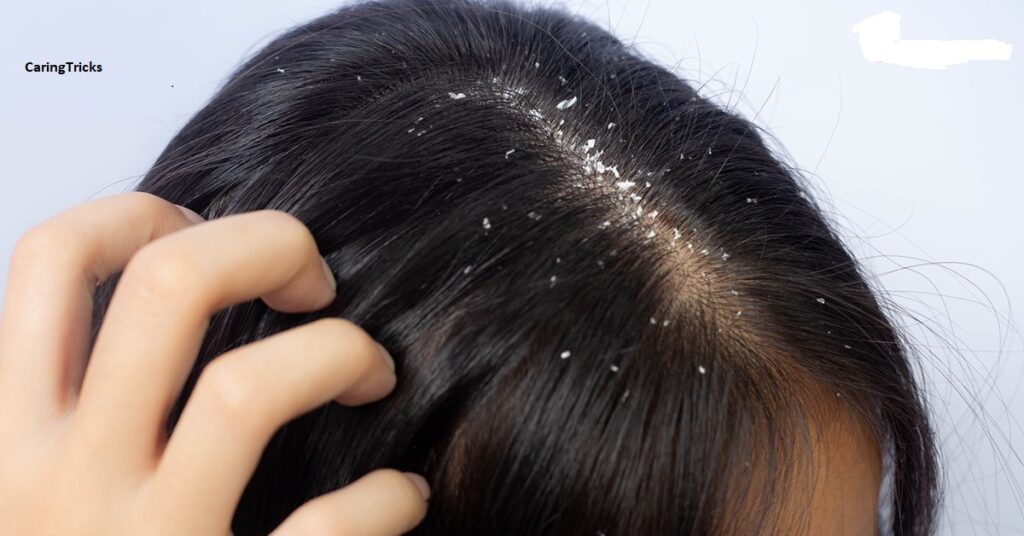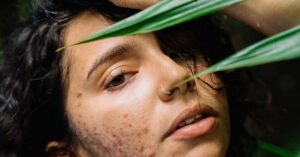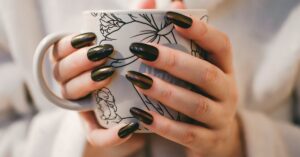How to Get Rid of Dandruff; Winter Special?

A common skin ailment called dandruff causes skin cells to renew more quickly than usual. Huge layers of dead skin are evidently shed from the scalp as a result. It can cause irritation and itching on your scalp and is frequently brought on by bacteria or fungus on the skin, or it might be a sign of psoriasis or seborrheic dermatitis.
Winters may produce dandruff, itchy, frizzy hair, and a harsh, dry feeling on the skin. This occurs because there is a persistent moisture imbalance since we prefer to sweat less during the colder months.
Due to several circumstances, scalp can become more bothersome in the winter:
Air temperature:
The drying effects of the chilly winter air and warm interior environments may wreak havoc on the skin’s moisture balance.
Seasonal stress:
Wintertime for some people means more stress and weariness, which can lead to scalp issues.
Seasonal allergies:
Winter allergies may manifest as a result of increased exposure to indoor allergens such dust mites and mould.
Physical imbalances:
Dietary modifications and seasonal hormonal variations may also be involved.
Numerous variables:
Variations in the intensity of symptoms can be caused by a confluence of the a fore mentioned elements (as well as others).
Risk elements:
Although almost anybody can get dandruff, several things might increase your risk:
Age:
Dandruff usually begins in youth and lasts into midlife. This isn’t to say that elderly folks don’t have dandruff. For other people, the problem may last permanently.
Manhood:
Testosterone is an androgen hormone that promotes sebaceous gland activity. A higher probability of an inflammatory response and dandruff results from more oil. Dandruff affects males more commonly than it does women.
A few diseases:
The chance of developing dandruff seems to be increased by conditions like Parkinson’s and other illnesses of the nervous system.
Shiny skin:
You are more likely to develop seborrheic dermatitis if you possess naturally oily skin.
Using a scalp oil:
Some oils can hide the scale, but they can exacerbate the flaking and itchy reaction.
A compromised immune system:
SD is more common among those who have had organ transplants, as well as in those who have AIDS, hepatitis C, or alcoholic’s pancreatitis. For instance, between 30 and 83 percent of HIV-positive people experience SD.
Shampooing practices:
Washing seldom can make dandruff worse in people that are already at danger for it.” Long pauses may cause an accumulation of oil that may result in dandruff.
Prior history of various skin conditions:
Acne, psoriasis, eczema, and rosacea can cause or aggravate seborrheic dermatitis.
Symptoms for Dandruff:
- Skin flaking on your shoulders, beard, hair, brows, and scalp may be signs of dandruff.
- Scalp dryness
- The scalp of a baby with cradle cap is scaly and crusty.
Stress can aggravate the symptoms, which tend to intensify during the cold, dry months.
Diagnosis for Dandruff:
People may essentially self-diagnose dandruff by looking for signs of an itching, dry, and flaky scalp. Seborrheic dermatitis manifests as skin that is reddish in color and has mild, oily yellow scale and plaques with fuzzy borders.
A dermatologist often just needs to check your scalp to establish whether you have dandruff. According to the Cleveland Clinic, if your flakes does not improve after therapy, your doctor may need to do a skin biopsy to rule out any other underlying conditions.
Treatment for Dandruff:
Although dandruff is frequently a chronic issue, it is manageable with the right care. Start by washing with a non-medicated shampoo, vigorously massaging the scalp, and then thoroughly rinsing.
Regular shampooing gets rid of flakes, lessens oiliness, and stops the formation of dead skin cells. Special anti-dandruff shampoos are typically beneficial if this does not work. The exact shampoo being used will determine the use instructions. Some are utilized every day, while others are used only one or thrice a week.
Look for antidandruff chemicals in over-the-counter shampoos including ketoconazole*, selenium sulfide, salicylic acid, sulfur, coal tar, or zinc pyrithione. Apply a tiny quantity of mineral oil to the dry parts of the scalp of a baby who has cradle cap to help the scales soften. Then gently wipe away the scales. The baby’s hair can then be washed with gentle baby shampoo.
Shampoo often, lower your stress levels, consider cutting back on or quitting using hair products (such gels and sprays), and maintain a balanced diet to help keep scalp under control.
These are some natural remedies for removing flakes from your hair:
Exfoliating your scalp:
Using a head massager to exfoliate your skin once a week will also aid in a thorough cleansing of your scalp, hence decreasing any impurities and grime that may cause dandruff. If you want a healthy scalp and gorgeous, strong hair, oil massage and hair treatments should be a part of any hair care regimen.
There are the natural treatments for wintertime dandruff. What you can do is as follows.
Baking Soda:
The scalp can be exfoliated with baking soda. Rinse it off, then gently wipe. On the day that you use baking soda, avoid using shampoo or soap on your hair.
Lemon juice and coconut oil:
Citric acid, which is present in lime juice and helps to balance the pH of the scalp, cleans the scalp. This hinders the development and survival of the dandruff fungus. Coconut oil maintains the hair healthy and lustrous by hydrating the scalp and hair strands.
Application: Use circular strokes to massage coconut oil over your scalp. Lime juice and water should be diluted. Put this mixture on the hair using the cotton ball. After turning it on, wait 20 minutes. Use an anti-dandruff shampoo to wash your hair.
Apple Cider Vinegar:
After removing your shampoo, combine equal measures apple cider vinegar and water and spray the solution over your hair. After 5 minutes, remove it by rinsing it off with warm water.
Orange juice and green tea:
By decreasing excessive production of sebum in the scalp, green tea heals dandruff. Orange juice is a wonderful choice for treating winter dandruff due to its acidic pH and high vitamin C concentration.
You will require 2 tsp of oranges juice and 4 teaspoons of green tea.
Directions:
- Combine the orange juice and green tea.
- Apply this concoction to your scalp.
- After 20 minutes, remove it and shampoo with an anti-dandruff shampoo.
Lemon with Honey:
Lemon helps to stop the itching, and honey is a natural moisturizer that keeps the scalp moistened. Add a couple drops of lemon juice to three tablespoons of honey. Use this on your scalp, and then let it on for fifteen minutes. Remove it using a gentle shampoo.
Oil of neem:
You can obtain relief from dandruff and an itchy scalp by using neem hair oil. For maximum results, use it twice weekly along with a gentle wash.
Improve the shampoo:
Add a couple drops of peppermint or tea tree your normal shampoo. After two to three washes, noticeable results are evident. Yu will require 2 drops of tea tree oil and fifty milliliters of almond oil:
Directions:
- Add almond oil to tea tree oil to dilute it.
- Give this mixture a good shake before massaging it into your scalp.
- Wait 30 minutes before cleaning it.
To avoid irritating the skin, tea tree oil must be diluted before use. If you have a delicate scalp, you should avoid using tea tree oil.
Prevention for Dandruff:
Here are a few more essential hints and techniques to maintain your hair and scalp healthy during the winter.
Pick a moisturizing anti-dandruff shampoo as a preventative measure:
Verify if it truly works to combat dandruff. You will be searching for an active component that shields your scalp from the impacts of the bacterium that causes dandruff. To help your dry scalp, check for shampoos and conditioners that guarantee moisturization.
Wash at least three times each week. The condition of your scalp’s skin will improve more as you use your anti-dandruff shampoo.
Avoid scratching:
Scratching increases skin damage and makes flakes more noticeable. If it’s particularly irritating, instead, push your fingers on your skull.
Avoid items like dry indoor air that might cause your scalp to become dry. To help keep your scalp hydrated, use a humidifier.
Guard your hair against the elements:
Your hair may suffer in the winter’s chilly, soggy conditions. Use hat or scarf to cover the head, bur just be careful that it is not too tight because it will cut off your scalp’s blood flow.
Using a winter hat might protect your hair, but it can also cause perspiration to accumulate and irritate your scalp.
In order to halt dandruff in its tracks as flakes start to develop, use an anti-dandruff shampoo.
Remain hydrated in both your scalp and hair:
Drink plenty of water to maintain your hair and scalp skin moisturized since dehydration will show on the surface.
When you use Head & Shoulders Dry Scalp Care Shampoo, you can hydrate a dry scalp brought on by the wintertime and temperature changes between the indoors and outside.
Avoid styling your hair too much:
Use curling irons and hair dryers sparingly since the heat can dry out your hair and scalp and lead to damage.
Afraid of heat damage to your hair? Try the Shampoo Repair & Protect.
While it may be tempting to wash your hair with hot water during the colder months, try to avoid doing so and instead use warm or cool water to prevent damage.
Hot water might harm your scalp’s fragile epidermis, which could be more sensitive in the winter, and dry out your hair.
Avoid traveling with wet hair:
Spend a little additional time blow-drying your hair or letting it air dry before leaving the house. In cold weather, the hair will require a long time to dry, and if it freezes, you risk breaking.
What Else Do I Need to Know?
Seborrheic dermatitis is a skin condition that can affect various regions of the body, such as the brows, nose wrinkles, ears, sideburns, and beard.
When Should I Contact a Physician?
If any of the following occurs:
- Dandruff doesn’t clear up after using dandruff shampoo.
- Itching or dandruff get worse.





